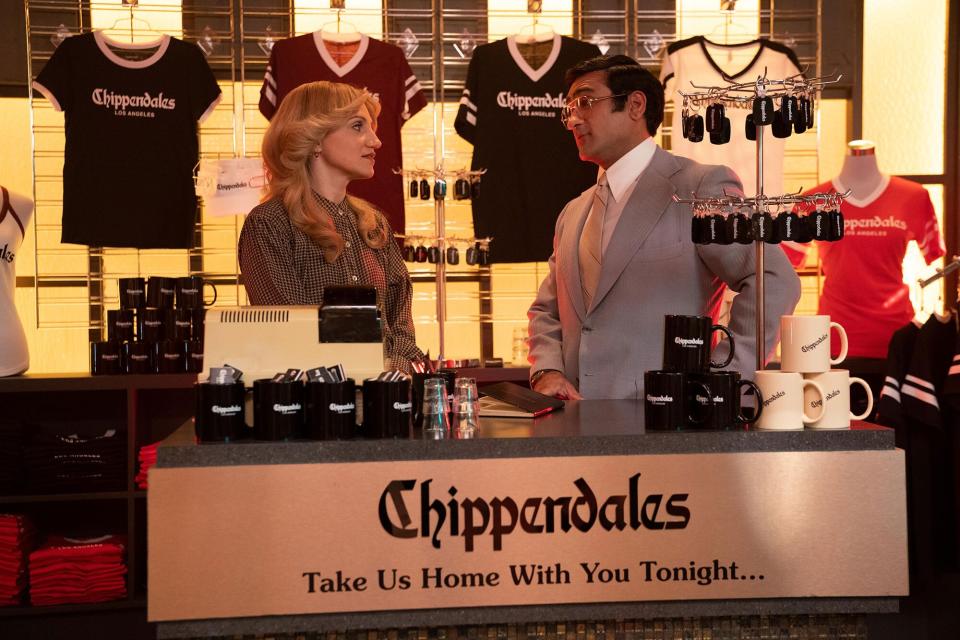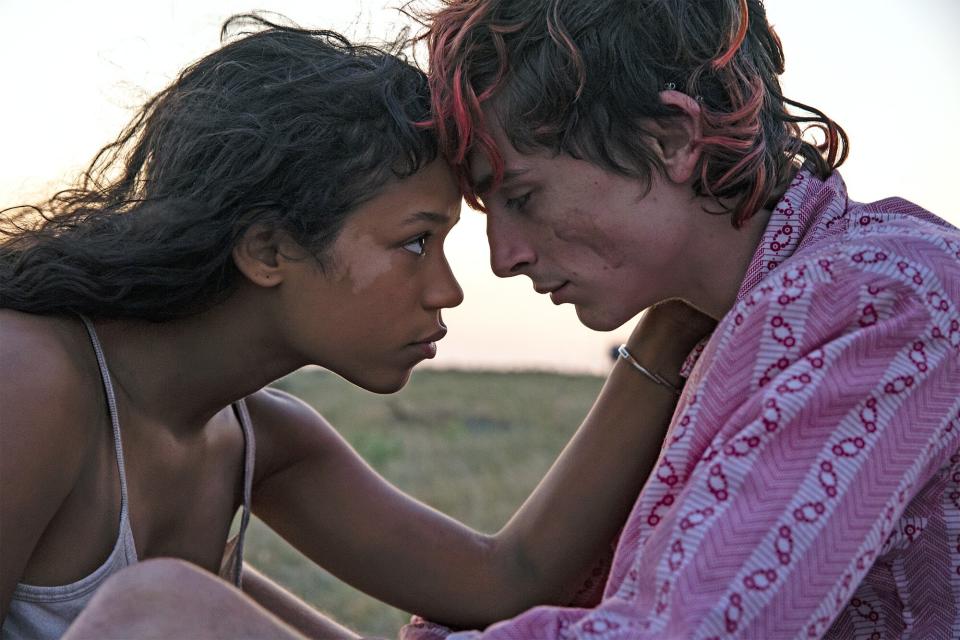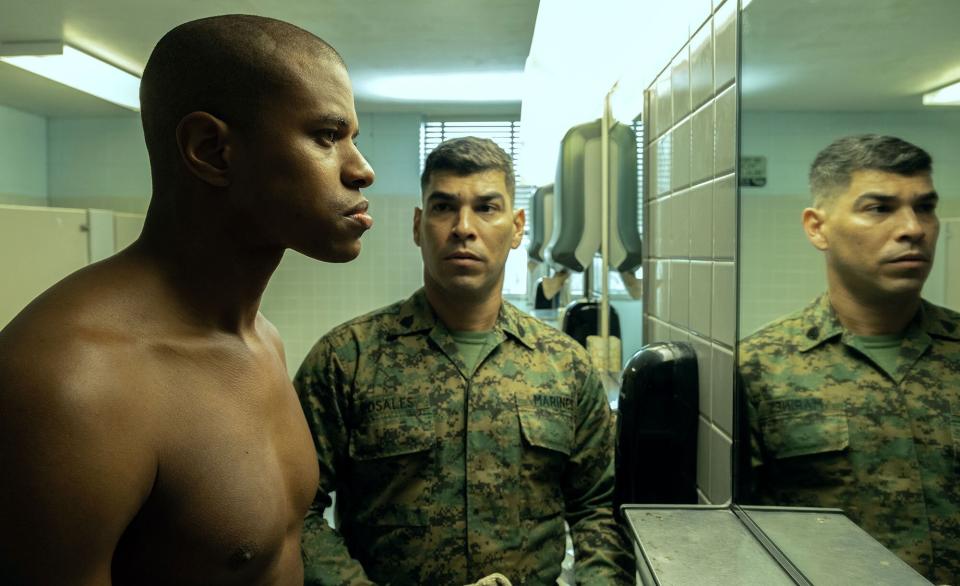The Menu and Bones and All serve up dark feasts, Welcome to Chippendales goes beyond beefcake
- Oops!Something went wrong.Please try again later.
- Oops!Something went wrong.Please try again later.
- Oops!Something went wrong.Please try again later.
- Oops!Something went wrong.Please try again later.
Welcome to Chippendales
(Premiering Nov. 22 on Hulu)

Erin Simkin/Hulu Annaleigh Ashford and Kumail Nanjiani in 'Welcome to Chippendales'
The true-crime tale of Chippendales founder Somen "Steve" Banerjee checks all the true-crime boxes: romance, arson, murder for hire, a jailhouse suicide, a self-made immigrant entrepreneur chasing the American dream. It's Theodore Dreiser by way of Dateline. It's been told and retold via TV movies, podcasts, and books, and after several false starts on the big screen, the sordid story assumes its final form as an inevitable limited series on Hulu. Welcome to Chippendales doesn't reveal much those other projects haven't already covered, but it's buoyed by commanding performances from stars Kumail Nanjiani and Annaleigh Ashford.
Somen Banerjee (Nanjiani) dreams of opening a classy, sophisticated establishment in Los Angeles — like his idol, Hugh Hefner, did with the Playboy Club. After an epiphany — what about a strip club for women? — Steve teams up with big-talking choreographer Nick De Noia (Murray Bartlett), whose biggest claim to fame is a pair of Emmys for a kids show called Unicorn Tales. From there, a g-string empire is born.
Chippendales spends too much time on Nick and Steve's tug-of-war for control over the company, and not enough on the complex (and far more interesting) ways Banerjee's immigrant experience drove his actions. Steve amasses wealth and all-American status symbols like a gold Rolex and a mansion, but the press embraces Nick — charming, telegenic, white — as the public face of Chippendales. Even though he's experienced discrimination for years, Steve conspires to keep Black men out of his clubs, leading to a class-action lawsuit that hastens Chippendales' financial troubles.
Nanjiani elicits a gentle humor from his character's mien without undercutting the seething indignation and pride he reveals in private. As Steve's wife Irene, Ashford is the series' emotional center, and she and Nanjiani have a tender, enchanting chemistry. But Steve squanders his wife's faith in him one too many times, and when she leaves, both he and the show suffer. Like so many other true-crime adaptations, Chippendales rushes through the aftermath of the crime at its center, cramming the totality of Steve's downfall into the 36-minute finale. It's a shame, because that's where the story could have gotten really interesting, as a ruthless, one-time power player is stripped down to nothing but the consequences of his own actions. Grade: B —Kristen Baldwin
Bones and All
(In theaters now)

Yannis Drakoulidis/MGM
Bones is not the first film about gorgeous cannibals this year, or even this festival season (Fresh had a head start at Sundance). But it is directed by Luca Guadagnino, the Italian auteur behind arthouse swoons like I Am Love and Call Me by Your Name, and thus arrives with certain expectations: that it will be transgressive and romantic and probably inscrutably beautiful, or at least beautifully inscrutable.
In the drab suburbs of mid-'80s America, a shy teenager named Maren (Waves' Taylor Russell) has urges she can't control, which is why her dad (André Holland) deadbolts her door at night, and why they don't use their real names every time they have to move to another town. But even he throws up his hands when she bites a chunk out of a school friend, like some flesh fiend out of a midnight movie.
Once Maren connects with another "eater" named Lee (Timothée Chalamet), though, Bones essentially becomes Cannibals: A Love Story. Beneath the visceral shock of its premise — and trust that there will be blood, along with torn skin and tendons and at least several organs á la carte — is less a straightforward horror exercise than a road-trip romance edged in darkness, in the vein of Badlands or Bonnie and Clyde or even Thelma & Louise. Take away the people-eating, and it could almost be a Springsteen song.
Russell and Chalamet are both indisputably lovely to look at throughout, even in their insistent road-scuzz grubbiness. (Bathing on the lam is a privilege, not a right.) Guadagnino, working Stateside for the first time, seems to revel in the dust and squalor of off-the-map '80s Americana, a place comprised of corn fields and carnivals and weed-choked parking lots. In all that there's some deeper metaphor, no doubt, about carrying the stain of otherness, and all the ways that love and shame can sublimate even a person's closest-held beliefs. Otherwise it's just two crazy kids with hope in their hearts and a femur bone, perhaps, in their throats, running as fast they can. Grade: B+ —Leah Greenblatt
The Menu
(In theaters now)

Eric Zachanowich/Searchlight Pictures
If we cannot eat the rich, at least we can enjoy their suffering on screen with a side of fermented sea lettuce and light schaudenfraude in The Menu, a glossy, skewering satire. (That it comes from a director who helmed more than a dozen episodes of Succession feels, at the least, apropos.)
Tyler (The Great's Nicholas Hoult), is the kind of guy whose self-identification as a foodie seems to comprise his entire personality: Whatever he does for a living — it's never said, though it must be lucrative — his interests begin and end with the dogged pursuit of elevated eating; if you cook it (or confit it, or turn it into a gelé), he will come. That's why he's one of a dozen people boarding a boat to a small island to have dinner at Hawthorne, a modernist temple of molecular gastronomy overseen by a celebrated chef named Julian Slowik (Ralph Fiennes), and paying $1,250 per head for the privilege.
"What, are we eating a Rolex?" Tyler's date Margot (Anya Taylor-Joy) scoffs, incredulous — though this crowd probably would, as long as it were served sous-vide. Among the guests, there's a washed-up movie star (John Leguizamo) and his fed-up assistant (Aimee Carrero), a starchy older couple (Reed Birney and Judith Light) who've already done this many times before, a vaunted critic (Ozark's Janet McTeer) and her toadying editor (Paul Adelstein), and a trio of braying finance bros (Rob Yang, Arturo Castro, and Mark St. Cyr). If anyone doesn't belong there it's Margot, and Julian, his unblinking gaze like an X-ray, seems to know it.
On arrival, the bespokeness of the Hawthorne experience, raw and windswept, does not disappoint. But Elsa (Watchmen's Hong Chau), the restaurant's unflappable hostess, seems to seethe beneath her faultless civility, and the kitchen staff treat Julian more like a cult leader than a man who makes entrées out of "charred milk lace" for millionaires. It doesn't take many courses — an opulent parade of breadless bread plates, elaborately tweezered proteins, and unknowable foams — for the bloody unraveling to begin.
The neat, nasty script, by Seth Reiss and Will Tracy, has no shortage of broad targets on its dartboard; when have the follies of the rich and feckless not been easy fodder for black comedy? Fiennes in particular, though, makes a feast of his role; The Menu's swishy, gleeful satire may not be his ordinary milieu, but he's too good an actor not to turn Julian into a far better monster than we probably deserve, careening between sniffy pique, red-hot malevolence, and small strange pockets of tenderness. The story loses some momentum in the final third, its platinum-card fools and clueless masters of the universe tipping into caricature. Still, the movie's appetite for destruction is too much fun to refuse: a giddy little amuse bouche for the apocalypse to come. Grade: B+ —Leah Greenblatt
She Said
(In theaters now)

JoJo Whilden/Universal Pictures Zoe Kazan and Carey Mulligan in 'She Said'
She Said, torn from very recent headlines, arrives with still-fresh outrage to mine, and a villain whose dimensions are less that of a man than a monster from a fairy tale: the famed Hollywood ogre Harvey Weinstein. It's faithfully acted by an earnest, intelligent cast, and directed with fervent purpose by Maria Schrader. But the result, for all its galvanizing, well-oiled plot machinations, remains consistently earthbound, and often frustratingly schematic, a movie so bent toward education and edification that it feels a little bloodless in the end — human tragedy as PSA.
The litany of Weinstein's most famous targets is well known to us now: household names like Rose McGowan, Ashley Judd, and Gwyneth Paltrow, all of whom appear here in some form (McGowan is represented by an actor's voice on the phone, while Judd plays herself; Paltrow remains a vaporous presence, teasingly out frame). But the mogul's transgressions were hardly confined to A-list actresses, and the methodical, almost faultlessly respectful screenplay by Rebecca Lenkiewicz (Disobedience, Colette) smartly threads several of his lesser known victims throughout the narrative — the young production assistants, aspiring ingenues, and low-level Miramax employees who bore the brunt of his volcanic temper and grotesque sexual demands for decades.
When New York Times investigative reporters Jodi Kantor and Megan Twohey, played here with engaging, unfussy fortitude by Zoe Kazan and Carey Mulligan, first began circling the story back in 2016, none of this was public record; it was just a few loose threads to tug at as the amorphous idea of a larger #MeToo movement began to take shape. Said follows the pair home as they begin to piece together their reporting, toggling between the bustling Times office and more intimate domestic scenes (Kazan's Jodie struggling to balance 2 a.m. cold calls with the needs of her husband and two little girls; Mulligan's Megan chasing down leads as a way to stave off postpartum depression).
What the movie does to humanize both these women — and their skittish, often terrified witnesses — feels more fully realized than the procedural bits, which tend to come off like a broad discourse on How Journalism Works. Oddly, one of its most affecting incidents comes near the end, when actual audio of Weinstein berating an Italian model in a Manhattan hotel room is played as part of a larger scene. (There's an excellent, devastating British documentary from 2019 called Untouchable currently streaming on Hulu, if you prefer your hard truths more unfiltered.) She Said finishes on a triumphant note, but those few harrowing moments offer a stark reminder that the reckoning for Weinstein, and all who followed him, is far from done. Grade: B —Leah Greenblatt
The Inspection
(In theaters now)

Patti Perret/A24 Jeremy Pope and Raúl Castillo star in A24 film 'The Inspection.'
None of the boot camp movies we've seen — everything from An Officer and a Gentleman and Full Metal Jacket to Private Benjamin and Stripes — make it seem like a warm and welcoming place. Elegance Bratton's assured if conventional feature debut, based on his own experiences becoming a Marine in 2005, won't change that impression, though it does beg the question: Why would an uncloseted gay man (Tony nominee Jeremy Pope, playing a version of the future director), already kicked to the curb by his religious, disapproving mother (a ferocious Gabrielle Union), decide that a physically demanding regimen of homophobic shouting in the face was the way forward?
The Inspection doesn't linger long on that question, but there's a well-constructed satisfaction in its familiar progression of hazing rituals alternating with glints of steely determination and unlikely camaraderie. You see everything coming from miles away: the barracks beatings, the hero's moment of weakness, the inspirational pep talk, the hard-earned brotherhood. Bratton's command of the material compensates, and his re-creation of Parris Island without the participation of the military is impressive. Union's sour presence suggests the tougher film that could have been, bookending the movie with a double dose of viciousness; theirs is a relationship that won't be solved by a crisp uniform. If this is Bratton's calling card — and it should be — her scenes are the ones that suggest the real promise to come. Grade: B —Joshua Rothkopf
Related content:

